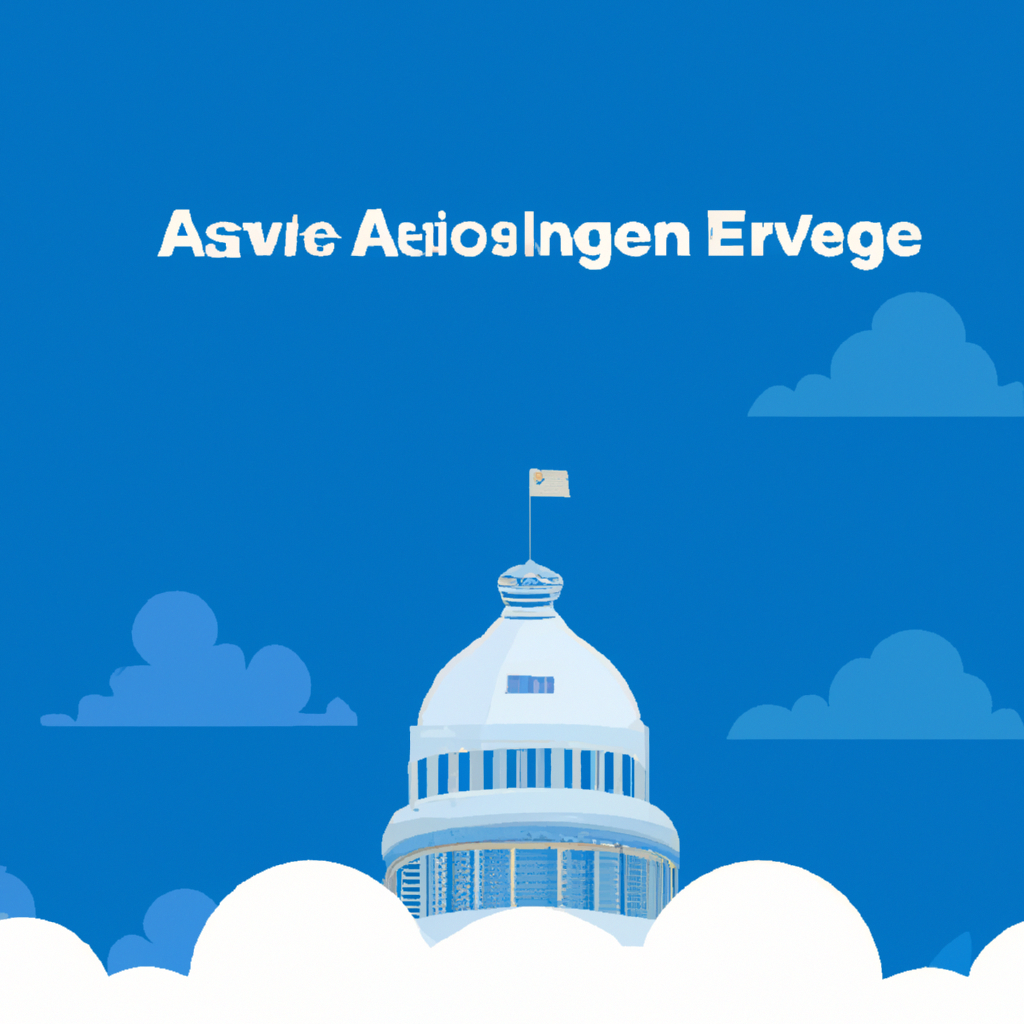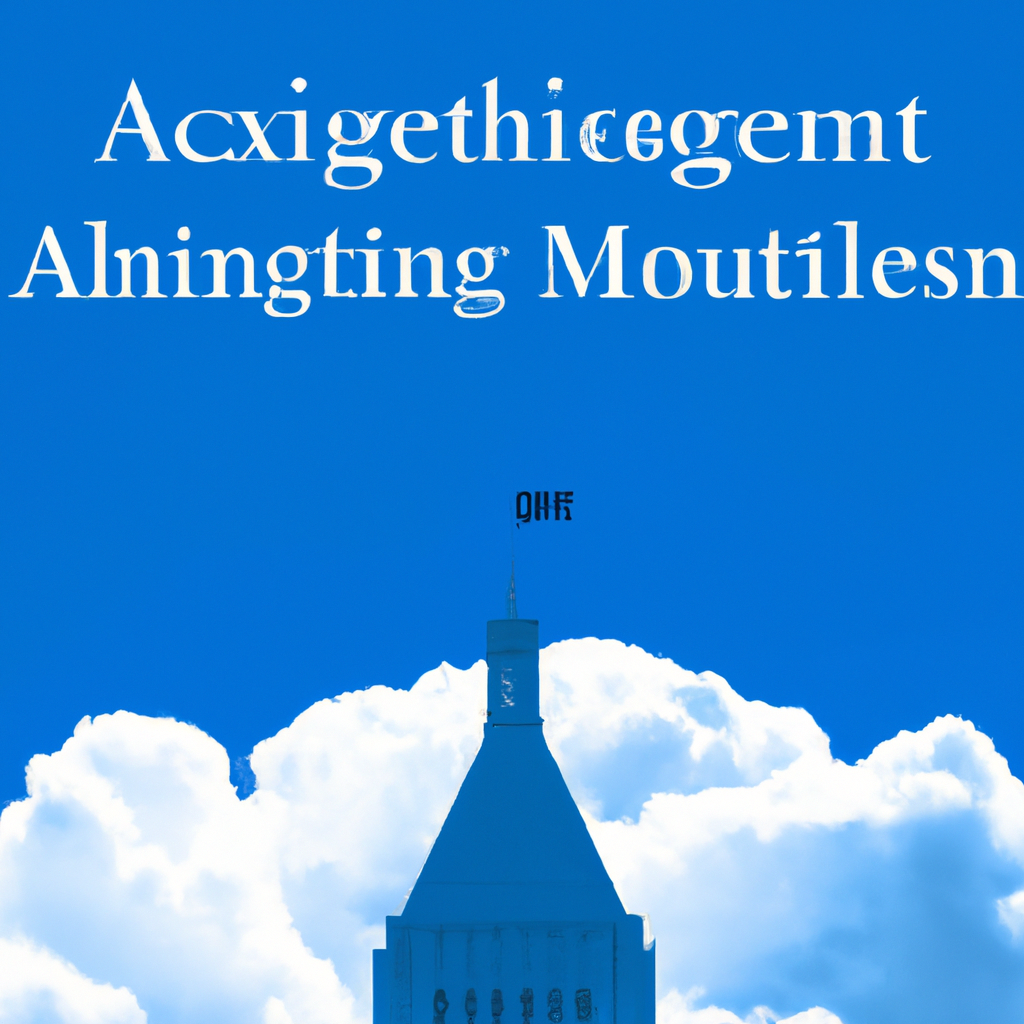Imagine having access to a robust and secure cloud computing platform specifically designed for government organizations. Azure for Government offers incredible potential for public sector solutions, enabling agencies to harness the power of the cloud to streamline operations, enhance collaboration, and improve citizen services. With its advanced features, stringent security measures, and extensive compliance certifications, Azure for Government is revolutionizing the way government agencies operate, paving the way for a more efficient and digitally-driven future. Discover how Azure for Government can unlock numerous possibilities for the public sector and propel government agencies into the modern age of technology.

Overview
Azure for Government is a powerful cloud computing platform designed specifically for the public sector. With its robust features and comprehensive suite of services, Azure for Government provides government agencies and organizations with the tools they need to modernize their infrastructure, enhance their data management and analytics capabilities, leverage the power of artificial intelligence and machine learning, optimize their IoT deployments, develop applications efficiently, implement hybrid and multi-cloud solutions, streamline their DevOps processes, and migrate and modernize their existing systems.
What is Azure for Government
Azure for Government is a cloud computing platform that is specifically tailored to meet the unique needs and requirements of government agencies and organizations. It provides a highly secure and compliant environment for storing, managing, and analyzing data, as well as a wide range of tools and services for building, deploying, and maintaining applications. Azure for Government offers a dedicated government cloud that is isolated from the public Azure cloud, ensuring that sensitive government data and applications are protected.

Benefits of Azure for Government
There are numerous benefits to using Azure for Government. First and foremost is the enhanced security and compliance offered by the platform. Azure for Government is built on a foundation of industry-leading security measures and protocols, ensuring that government data and applications are protected from cyber threats and unauthorized access. Additionally, Azure for Government complies with various government regulations and standards, enabling agencies to meet their compliance requirements without sacrificing performance or functionality.
Another major benefit of Azure for Government is its scalability and flexibility. The platform allows government agencies to quickly and easily scale their infrastructure up or down to meet changing demands, ensuring that they can effectively manage peak workloads and optimize resource utilization. Azure for Government also offers a wide range of services and tools that enable government agencies to effectively leverage emerging technologies such as artificial intelligence, machine learning, IoT, and more.
Furthermore, Azure for Government helps government agencies accelerate their digital transformation initiatives. By providing a comprehensive set of tools and services, the platform enables agencies to modernize their infrastructure, streamline their operations, and deliver better services to citizens. The platform also fosters collaboration and innovation by providing a secure and reliable environment for agencies to build, test, and deploy applications.
Use cases of Azure for Government
Azure for Government is utilized by government agencies and organizations across a wide range of use cases. One common use case is data management and analytics. Azure for Government offers powerful data management and analytics tools, such as Azure Data Lake, Azure SQL Database, Azure Cosmos DB, and Azure Cognitive Services, enabling agencies to securely store, process, and analyze large volumes of data. This enables agencies to gain valuable insights and make data-driven decisions, leading to improved efficiency and effectiveness.
Another use case for Azure for Government is the deployment of artificial intelligence and machine learning technologies. With services such as Azure Machine Learning, Azure Databricks, Azure Bot Services, and Azure Cognitive Services, agencies can leverage the power of AI and ML to automate processes, enhance decision-making, and deliver personalized experiences to citizens. Whether it’s developing intelligent chatbots, implementing predictive maintenance solutions, or analyzing large datasets, Azure for Government provides the tools and capabilities needed to harness the potential of AI and ML.
Azure for Government is also well-suited for IoT deployments in the public sector. With services like Azure IoT Hub, Azure IoT Central, Azure Digital Twins, and Azure Time Series Insights, government agencies can securely connect, monitor, and manage their IoT devices and assets. This enables agencies to optimize operations, improve infrastructure management, and deliver innovative IoT solutions that enhance public safety, transportation systems, environmental monitoring, and more.
Additionally, Azure for Government provides a comprehensive suite of application development tools and services. Whether it’s building web and mobile applications with Azure App Service, creating serverless functions with Azure Functions, automating workflows with Azure Logic Apps, or managing APIs with Azure API Management, government agencies have the tools and resources necessary to develop and deploy high-quality applications quickly and efficiently.
Furthermore, Azure for Government offers hybrid and multi-cloud solutions, allowing agencies to seamlessly integrate their on-premises infrastructure with the cloud. With services like Azure Stack, Azure Arc, Azure ExpressRoute, and Azure Virtual WAN, agencies can build hybrid environments that provide the flexibility and scalability of the cloud while still maintaining control over their data and applications. These solutions enable agencies to leverage the benefits of both on-premises and cloud infrastructure, ensuring that they can meet their specific requirements and optimize their resources.
For government agencies looking to streamline their DevOps processes and implement continuous integration and continuous deployment (CI/CD), Azure for Government offers a range of tools and services. Azure DevOps provides a complete set of features for planning, developing, testing, and deploying applications, while Azure Pipelines enables agencies to automate their CI/CD pipelines. Azure Repos provides a secure and scalable Git repository, and Azure Artifacts allows for the management of packages and artifacts.
Lastly, Azure for Government supports migration and modernization efforts in the public sector. With services like Azure Migrate, Azure Site Recovery, Azure VMware Solution, and Azure App Service Migration Assistant, agencies can efficiently migrate their existing applications and systems to the cloud. This enables agencies to take advantage of the scalability, agility, and cost-effectiveness of the cloud while minimizing disruption and ensuring a smooth transition.

Security and Compliance
Government agencies have specific compliance requirements that need to be met to ensure the confidentiality, integrity, and availability of their data and applications. Azure for Government understands these requirements and provides a highly secure and compliant environment.
Azure for Government meets various government compliance requirements, including FedRAMP, ITAR, DoD SRG, CJIS, and more. This means that government agencies can confidently use Azure for Government to store, process, and analyze sensitive data, knowing that it meets stringent regulatory standards.
In addition to compliance, Azure for Government offers Azure Security Center, a unified security management system that provides advanced threat protection, vulnerability management, and security recommendations. With the Security Center, agencies can monitor and secure their cloud resources, detect and respond to threats in real-time, and gain valuable insights into their security posture.
Azure Sentinel, another powerful security solution offered by Azure for Government, provides intelligent security analytics and threat intelligence. It helps agencies detect, investigate, and respond to threats across their entire Azure environment and on-premises infrastructure. Azure Sentinel utilizes artificial intelligence and machine learning to analyze vast amounts of security data, identify potential threats, and provide actionable insights.
Data Management and Analytics
Data management and analytics are critical components of any government agency’s operations. Azure for Government offers a comprehensive suite of services and tools to help agencies securely store, manage, and analyze their data.
One key service offered by Azure for Government is Azure Data Lake. Azure Data Lake provides a scalable and secure data repository that can store and process large volumes of structured and unstructured data. Agencies can leverage Azure Data Lake to perform complex data analytics, build data-driven applications, and gain deeper insights into their data.
Azure SQL Database is another important data management service provided by Azure for Government. Azure SQL Database is a fully managed, secure, and scalable relational database service that enables agencies to store and manage their structured data. It offers built-in high availability, automatic backups, and advanced security features, ensuring that agencies can efficiently and securely manage their critical data.
Azure Cosmos DB is a globally distributed, multi-model database service that provides high throughput and low latency access to data. It allows agencies to store and retrieve data using various data models, including document, graph, key-value, and columnar. Azure Cosmos DB is ideal for applications that require high scalability, performance, and availability.
Azure Cognitive Services is a collection of AI services and APIs that agencies can leverage to add intelligence to their applications. These services include computer vision, natural language processing, speech recognition, and more. With Azure Cognitive Services, agencies can build applications that can understand, interpret, and interact with users and their data in more meaningful and natural ways.

AI and Machine Learning
Artificial intelligence and machine learning have the potential to revolutionize how government agencies operate and deliver services. Azure for Government provides a range of services and tools that enable agencies to leverage the power of AI and ML.
Azure Machine Learning is a scalable and fully managed ML service that enables agencies to build, deploy, and manage ML models at scale. Agencies can easily train models using their own data or pre-built models, and deploy them as web services or containers. Azure Machine Learning also provides advanced capabilities for model interpretation, automated ML, and data labeling.
Azure Databricks, on the other hand, is a fast, easy, and collaborative Apache Spark-based analytics platform. It enables agencies to process and analyze large volumes of data in a distributed and parallelized manner. With Azure Databricks, agencies can harness the power of big data and build advanced analytics solutions.
Azure Bot Services allows agencies to build, deploy, and manage intelligent chatbots that can interact with users through multiple channels including websites, mobile apps, and messaging platforms. These chatbots can automate repetitive tasks, provide personalized experiences, and assist citizens with their queries and requests.
Azure Cognitive Services, as mentioned earlier, provides a collection of AI services and APIs that agencies can utilize to enhance their applications. From analyzing sentiments in text to recognizing faces in images, Azure Cognitive Services enables agencies to add intelligent features to their applications without having to build ML models from scratch.
Internet of Things (IoT)
The Internet of Things (IoT) plays a crucial role in the digital transformation of government agencies. Azure for Government offers a suite of services specifically designed to help agencies securely connect, monitor, and manage their IoT devices and assets.
Azure IoT Hub is a fully managed service that provides secure and reliable communication between IoT devices and the cloud. Agencies can use Azure IoT Hub to register, manage, and communicate with their devices, remotely monitor and control them, and implement custom business logic for their IoT solutions.
Azure IoT Central, on the other hand, is a fully managed SaaS solution that simplifies the deployment and management of IoT applications. It provides pre-built templates and industry-specific solutions that enable agencies to quickly get started with IoT, without the need for extensive development or infrastructure management.
Azure Digital Twins is a service that models the physical environment in the digital world. It allows agencies to create a comprehensive digital representation of their assets, such as buildings, equipment, and infrastructure. By connecting sensor data to the digital twin, agencies can gain real-time insights, optimize operations, and improve asset performance.
Azure Time Series Insights is a fully managed analytics, storage, and visualization service for IoT time series data. It enables agencies to gain deep insights into their time-sensitive IoT data, perform root cause analysis, and track historical trends. With Azure Time Series Insights, agencies can make data-driven decisions, identify anomalies, and optimize their IoT deployments.

Application Development
Government agencies often need to develop and deploy applications to deliver services, automate processes, and enhance citizen engagement. Azure for Government provides a wide range of tools and services that enable agencies to develop applications more efficiently.
Azure App Service is a fully managed platform for building, deploying, and scaling web and mobile applications. Agencies can use Azure App Service to quickly create and deploy applications in multiple programming languages, integrate with various database systems, and implement CI/CD workflows. With built-in autoscaling and high availability, Azure App Service ensures that applications perform reliably and can handle peak workloads.
Azure Functions is a serverless computing service that enables agencies to run event-driven code without provisioning or managing servers. Agencies can use Azure Functions to implement business logic, process event data, and build serverless applications and architectures. With Azure Functions, agencies can focus on writing code and delivering business value, without the need to worry about infrastructure management.
Azure Logic Apps is a cloud-based service that allows agencies to automate workflows, integrate systems, and orchestrate business processes. It provides pre-built connectors to popular systems and services, enabling agencies to easily create workflows that span across different applications and platforms. Azure Logic Apps simplifies the development and management of complex integration scenarios, making it easier for agencies to connect their applications and systems.
Azure API Management is a platform that allows agencies to securely publish, manage, and monetize APIs. It enables agencies to expose their data and services as APIs, control access and usage, and gain insights into API usage and performance. With Azure API Management, agencies can create API ecosystems, drive partner innovation, and enhance citizen experiences by enabling third-party developers to build applications and services on top of their APIs.
Hybrid and Multi-Cloud Solutions
Government agencies often have a mix of on-premises and cloud infrastructure, as well as the need to integrate with other cloud providers. Azure for Government provides hybrid and multi-cloud solutions that enable agencies to seamlessly connect and manage their infrastructure.
Azure Stack is a hybrid cloud platform that lets agencies bring Azure services to their own data centers. It provides a consistent and integrated set of services across Azure and Azure Stack, allowing agencies to build and deploy applications once and run them anywhere. Azure Stack also enables agencies to meet data residency requirements and run workloads closer to their users.
Azure Arc extends Azure management and services to any infrastructure, whether it’s on-premises, in other clouds, or at the edge. It enables agencies to secure and manage resources across their entire environment using Azure management capabilities, policies, and governance. With Azure Arc, agencies can maintain control and visibility over their resources, regardless of where they are located.
Azure ExpressRoute provides a private and dedicated connection to Azure, bypassing the public internet. This enables agencies to establish a secure and reliable connection between their on-premises infrastructure and the Azure cloud. Azure ExpressRoute ensures low-latency and high-bandwidth connectivity, making it ideal for data-intensive workloads and applications that require consistent network performance.
Azure Virtual WAN simplifies network connectivity and provides optimized and automated branch-to-branch connectivity through Azure. Agencies can use Azure Virtual WAN to connect their branches, data centers, and cloud networks, ensuring that users and applications have fast and reliable access to resources. Azure Virtual WAN also provides network security and monitoring capabilities, making it easier for agencies to secure and manage their networks.
DevOps and CI/CD
DevOps practices and continuous integration and continuous deployment (CI/CD) are crucial for government agencies looking to deliver applications and services more rapidly and reliably. Azure for Government offers a range of tools and services that support DevOps and CI/CD workflows.
Azure DevOps is a comprehensive set of development tools and services that enable agencies to plan, develop, test, and deploy applications efficiently. It provides features such as agile planning, version control, build and release automation, and test management. With Azure DevOps, agencies can foster collaboration, automate processes, and deliver high-quality applications to their users.
Azure Pipelines is a fully managed CI/CD service that enables agencies to continuously build, test, and deploy their applications to any platform or cloud. Agencies can use Azure Pipelines to define their pipelines as code, automate build and release processes, and integrate with their favorite development tools and services. With Azure Pipelines, agencies can accelerate their delivery cycles and ensure the reliability and quality of their applications.
Azure Repos is a secure and scalable Git repository for agencies to host and manage their source code. It provides advanced features such as branch policies, code search, code reviews, and pull requests, making it easier for agencies to collaborate and maintain code quality. Azure Repos supports Git and Team Foundation Version Control (TFVC), ensuring flexibility and compatibility.
Azure Artifacts is a repository and management system for software packages and artifacts. It enables agencies to publish, store, and manage their packages and dependencies, ensuring that their applications have consistent and reliable dependencies. Azure Artifacts integrates seamlessly with Azure Pipelines and Azure DevOps, providing a complete end-to-end solution for agencies to manage their application lifecycle.
Migration and Modernization
Government agencies often have legacy systems and applications that need to be migrated to the cloud or modernized to meet current technological requirements. Azure for Government provides a range of tools and services to support migration and modernization efforts.
Azure Migrate is a central hub for agencies to discover, assess, and migrate their on-premises applications, infrastructure, and data to Azure. It provides a seamless and simplified experience for agencies to identify their migration readiness, perform dependency mapping, and estimate costs. Azure Migrate supports a wide range of migration scenarios, including virtual machines, databases, and web applications.
Azure Site Recovery enables agencies to replicate their on-premises virtual machines and physical servers to Azure, providing a disaster recovery solution and reducing downtime. It ensures that agencies can recover their applications and data quickly in the event of an outage or disaster. Azure Site Recovery also supports migration scenarios, allowing agencies to migrate their workloads to Azure with minimal disruption.
Azure VMware Solution enables agencies to run VMware workloads natively on Azure, without having to refactor or re-architect their applications. It provides a consistent and seamless VMware experience, allowing agencies to leverage their existing investment in VMware skills and tools. Azure VMware Solution supports VMware vSphere, vCenter, NSX, and vSAN, ensuring compatibility with existing infrastructure and tools.
Azure App Service Migration Assistant is a tool that helps agencies assess and migrate their on-premises web applications to Azure App Service. It provides guidance and insights into the migration process, enabling agencies to identify and address potential issues before performing the migration. Azure App Service Migration Assistant simplifies the migration of web applications, ensuring a smooth transition to the cloud.
Conclusion
Azure for Government is a powerful cloud computing platform that provides government agencies and organizations with the tools and services they need to modernize their infrastructure, enhance their data management and analytics capabilities, leverage the power of artificial intelligence and machine learning, optimize their IoT deployments, develop applications efficiently, implement hybrid and multi-cloud solutions, streamline their DevOps processes, and migrate and modernize their existing systems.
By harnessing the power of Azure for Government, government agencies can unlock new possibilities for digital transformation, innovation, and improved citizen services. Whether it’s securely managing and analyzing data, developing intelligent applications, optimizing IoT deployments, or streamlining application development and deployment processes, Azure for Government offers the comprehensive, secure, and compliant solutions needed to drive and support the digital transformation of the public sector.
As Azure for Government continues to grow and evolve, government agencies can expect further innovation and enhancements in the platform’s capabilities. With its commitment to security, compliance, scalability, and flexibility, Azure for Government remains a leading solution for government agencies looking to leverage the power of the cloud and drive meaningful change in the public sector.
